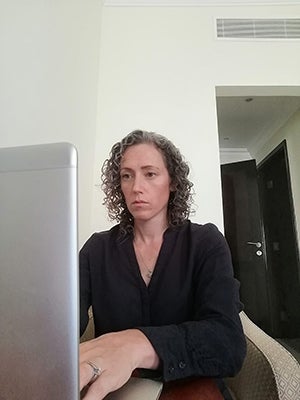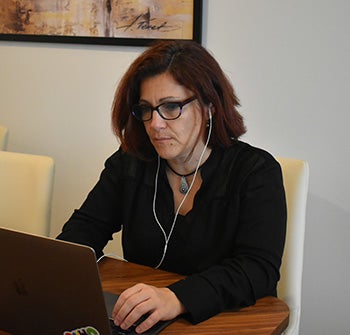Research on water, energy and the environment serving Qatar in managing pandemic

Over 650 researchers, scientists, engineers, policymakers, educators, and students participated in the recent COVID-19 related webinars organized by the Qatar Environment and Energy Research Institute (QEERI), part of Hamad Bin Khalifa University.
Presentations from three of its centers focused on QEERI’s core research areas - water, energy, and the environment – were followed by an interactive question and answer session, moderated by Dilraz Kunnummal, PR, Communications and Outreach Specialist at QEERI.
The first webinar titled, ‘Demystifying the Links between the COVID-19 Response and Local Air Quality’, was delivered by Mohammed Ayoub, Senior Research Director at QEERI’s Environment and Sustainability Center. Ayoub discussed the measured decreases in air pollution across greater Doha and potentially gauging the effectiveness of movement restrictions and compliance.
Addressing the future of air quality management, he said: “The research conducted by QEERI’s air quality program showed a significant improvement in air quality after the implementation of social distancing policies and movement restrictions. We believe this real-world experiment can provide the basis for future intervention strategies to manage air quality more effectively in greater Doha and across the country.”
 This was followed by ‘COVID-19 – The Water Perspective: The Impact and Value of Water Research to a Global Health Crisis’, delivered by Dr. Jenny Lawler, Senior Research Director, Water Center, QEERI.
This was followed by ‘COVID-19 – The Water Perspective: The Impact and Value of Water Research to a Global Health Crisis’, delivered by Dr. Jenny Lawler, Senior Research Director, Water Center, QEERI.
Discussing the body of global research into the impact of COVID-19 on drinking water and wastewater, Dr. Lawler reiterated that the drinking water which has been treated to Qatar standards is considered to be safe by the global water research. During the webinar, she explained: “Disinfection is key, and this ensures that the water we use is safe.” Dr. Lawler also highlighted the global research movement for the use of wastewater based monitoring to detect COVID at a population level and explained the potential for this approach to give an early warning system for the detection of hot spots or surges in caseloads, without the need for a full human biomonitoring program.
The third webinar, ‘Contribution of Energy-Related Research to Address the COVID-19 Crisis and Beyond’ was led by Dr. Veronica Bermudez, Senior Research Director, Energy Center, QEERI.
Dr. Bermudez focused on the efforts that are being made to translate renewable energy research into useful tools that can contribute to managing the COVID-19 crisis, particularly in mapping solar resources and the diffusion of photovoltaic systems in Doha’s neighborhoods. She also tackled how these tools can be further used for future epidemics or in similar crises. She said: “Our approach involves developing a risk awareness platform based on meteorological and environmental data and on creating a scale-free network to reproduce the architecture of a real-world social network that is as close to Qatari society as possible. The simulations allow us to compare different degrees of mobility and their effect in flattening the curve of pandemics, as well as forecast the evolution of the virus’ spread.”
 Concluding the webinar, Dr. Marc Vermeersch, executive director, QEERI, said: “At a time like this, when the community is worried about the pandemic, we recognize the need to share relevant information based on science and research done globally, and in Qatar. We hope that by sharing information related to COVID-19 and our core research areas of energy, water, and environment, we have helped the community understand COVID-19 a little bit more, and made them feel more relaxed and safer.”
Concluding the webinar, Dr. Marc Vermeersch, executive director, QEERI, said: “At a time like this, when the community is worried about the pandemic, we recognize the need to share relevant information based on science and research done globally, and in Qatar. We hope that by sharing information related to COVID-19 and our core research areas of energy, water, and environment, we have helped the community understand COVID-19 a little bit more, and made them feel more relaxed and safer.”
Since the onset of the COVID-19 pandemic, QEERI has realigned its research priorities. The Institute’s scientists, researchers, and engineers are committed to contributing to the fight against COVID-19 through research and innovation. QEERI is also collaborating with national and international stakeholders, and sharing its resources to mitigate the devastating impact of the crisis.









